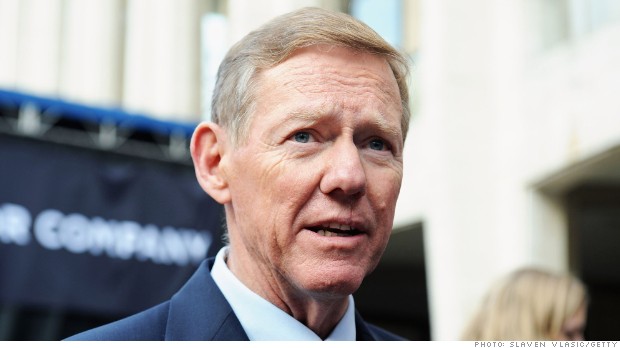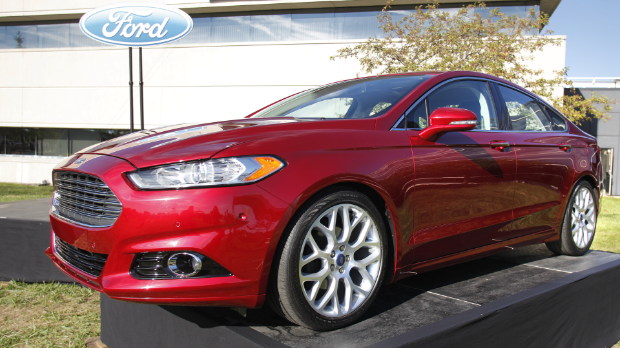 (Fortune) Ford CEO Alan Mulally is doing his best to tamp down speculation that he has become the frontrunner among the candidates to succeed Steve Ballmer as CEO of Microsoft. He tells USA Today that "I love serving Ford and have nothing new to add to (my) plans to continue serving Ford." Executive chairman Bill Ford underscored the point in an interview with Bloomberg television, saying "The plan is, he's going to stick around."
(Fortune) Ford CEO Alan Mulally is doing his best to tamp down speculation that he has become the frontrunner among the candidates to succeed Steve Ballmer as CEO of Microsoft. He tells USA Today that "I love serving Ford and have nothing new to add to (my) plans to continue serving Ford." Executive chairman Bill Ford underscored the point in an interview with Bloomberg television, saying "The plan is, he's going to stick around." Mulally's demurral, if not exactly Shermanesque ("I will not accept if nominated and will not serve if elected.") shows good sense. He is far better off to stay in his current job. A lot of the chatter saying otherwise seems misguided to me. Mulally is often described as a turnaround expert, and he has, in fact, arrested a long decline at Ford (F, Fortune 500) and made it reasonably profitable again.
But Microsoft (MSFT, Fortune 500) doesn't need a turnaround. This is a company that last year made a profit of $16 billion -- three times more than Ford and on a little more than half the turnaround. What Microsoft needs is a sense of purpose, something it hasn't had since the iPhone replaced the desktop computer as the default personal and Internet communication device. It needs to focus on what it does best and exit those businesses where it is an also-ran. That's not currently part of Mulally's current skill-set.
To be sure, those who see Mulally as Ballmer's successor have some convenient facts on which to build their arguments. Ballmer and Mulally are friends, and Mulally lived in Seattle when he ran Boeing's (BA, Fortune 500) commercial aviation business, and still has ties to the area. In addition, Mulally is interested in technology, for instance, regularly attending the Consumer Electronics show, and Ford has worked with Microsoft to develop in-car control and entertainment systems.
But for Mulally to leave the metal-bending, 110-year-old No. 10 company on the Fortune 500 for Bill Gates' baby, No. 35, would be bad for both Ford and Microsoft. Here's why:
1. Complexity
At both Boeing and Ford, Mulally ran businesses with single product lines -- planes and cars -- and faced off against big, visible competitors like Airbus, General Motors (GM, Fortune 500), and Toyota (TM). Not so with Microsoft. Besides software, it makes tablets and home entertainment devices, operates an Internet search engine, and recently bought phone maker Nokia. It faces competitors everywhere, including such juggernauts as Apple (AAPL, Fortune 500), Amazon (AMZN, Fortune 500), Oracle (ORCL, Fortune 500), and Google (GOOG, Fortune 500). Getting up to speed in all those businesses for someone just coming into the tech industry would require an impossibly steep learning curve.
2. Focus
Mulally's signature move at Ford was to abandon its old house-of-brands approach an! d focus exclusively on mass-market Ford cars and trucks. He called it One Ford. That strategy wouldn't work at hydra-headed Microsoft with its multiple product lines. In fact, many analysts believe is that Microsoft doesn't need focus as much as it needs dismemberment -- a division of the company and eventual divestiture -- along product lines.
 Ford Fusion now made in U.S.
Ford Fusion now made in U.S. 3. Resources
Ford was so cash-poor when Mulally arrived that he was forced to borrow $24 billion to keep the doors open after he arrived in 2006. The boom in auto sales has eased the cash squeeze, but successfully running a car company still requires a sharp pencil to make the most efficient use of assets. Microsoft, by comparison, is sitting on $60 billion in cash, as it hunts for acquisitions -- some more successfully (Nokia) than others (Yahoo). A mindset trained in scarcity doesn't easily make the transition to one that is rich with resources.
4. Teamwork
Ford is a happier and more productive place to work today because Mulally has tamped down intra-company feuds through his insistence on transparency and the force of his own personality. Microsoft would benefit from the same kind of overhaul -- any company would -- but its multiple product lines would dilute any such efforts.
5. Technology
Despite degrees in aeronautical and astronautical engineering, Mulally has something of a black thumb when it comes to consumer applications. Ford was one of the first to introduce touch-screen controls, but MyFord Touch, which was developed with Microsoft, has been plagued by owner complaints and pounded Ford's scores in third-party quality ratings. Mulally promised improvements in the system nearly two years ago, but problems persist.
6. Public image
Microsoft sometimes comes off as a giant bull! y -- and ! has the antitrust scars to show for it -- but Ford has been equally clumsy lately. In addition to being less than nimble in upgrading MyFord Touch, it was recently found to be overstating the fuel economy of its C-Max hybrid crossover and has been compensating owners for their missing mileage.
7. Unfinished business
In November, Mulally will end his seventh year as Ford CEO. While he has stabilized the company, created a cohesive management team, and instituted a methodical management system that should serve his successor well, he has much left to do. Ford still needs to successfully relaunch Lincoln, restructure its European operations, and catch up to other foreign automakers in China after a late start. In an unusually critical cover story headlined "Blue Oval Blues," Automotive News declared that Mulally's initiatives in quality, technology, and fuel economy so far have fallen short. Ford's board expects Mulally to remain on the job until the end of 2014, and he will need all of that time to get his house in order.
8. Age
Mulally may be the most energetic senior citizen around and loves his work, but he is still 68. Streamlining and optimizing a company of Microsoft's size and complexity is not a job that can be handed to a short-timer. Methodical as he is, Mulally spent weeks analyzing Ford's strategic assets before making a plan to go forward. Microsoft is too diversified and the tech industry moving too fast to allow the leisure for that kind of analysis.
Mulally is an uncommonly remarkable and successful executive, but he is the wrong person to run Microsoft. Both it and Ford will be better off if he stays where he is. ![]()
No comments:
Post a Comment